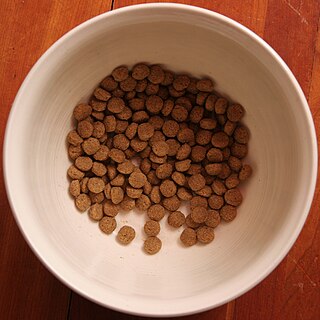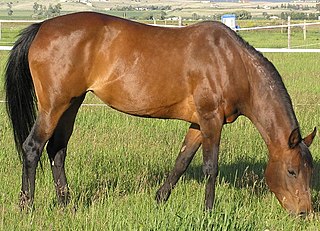Related Research Articles

Nutrition is the biochemical and physiological process by which an organism uses food to support its life. It provides organisms with nutrients, which can be metabolized to create energy and chemical structures. Failure to obtain sufficient nutrients causes malnutrition. Nutritional science is the study of nutrition, though it typically emphasizes human nutrition.

Dog food is specifically formulated and intended for consumption by dogs and other related canines. Dogs are considered to be omnivores with a carnivorous bias. They have the sharp, pointed teeth and shorter gastrointestinal tracts of carnivores, better suited for the consumption of meat than of vegetable substances, yet also have ten genes that are responsible for starch and glucose digestion, as well as the ability to produce amylase, an enzyme that functions to break down carbohydrates into simple sugars – something that obligate carnivores like cats lack. Dogs evolved the ability living alongside humans in agricultural societies, as they managed on scrap leftovers and excrement from humans.
A dietitian, medical dietitian, or dietician is an expert in identifying and treating disease-related malnutrition and in conducting medical nutrition therapy, for example designing an enteral tube feeding regimen or mitigating the effects of cancer cachexia. Many dietitians work in hospitals and usually see specific patients where a nutritional assessment and intervention has been requested by a doctor or nurse, for example if a patient has lost their ability to swallow or requires artificial nutrition due to intestinal failure. Dietitians are regulated healthcare professionals licensed to assess, diagnose, and treat such problems. In the United Kingdom, dietitian is a 'protected title', meaning identifying yourself as a dietitian without appropriate education and registration is prohibited by law.

Spirulina is a biomass of cyanobacteria that can be consumed by humans and animals. The three species are Arthrospira platensis, A. fusiformis, and A. maxima.

A lacto-vegetarian diet is a diet that abstains from the consumption of meat as well as eggs, while still consuming dairy products such as milk, cheese, yogurt, butter, ghee, cream, and kefir.

The Weston A. Price Foundation (WAPF), co-founded in 1999 by Sally Fallon (Morell) and nutritionist Mary G. Enig, is a U.S. 501(c)(3) nonprofit organization dedicated to "restoring nutrient-dense foods to the American diet through education, research and activism".
A nutritionist is a person who advises others on matters of food and nutrition and their impacts on health. Some people specialize in particular areas, such as sports nutrition, public health, or animal nutrition, among other disciplines. In many countries, a person can claim to be a nutritionist even without any training, education, or professional license, in contrast to a dietitian, who has a university degree, professional license, and certification for professional practice.

A plant-based diet is a diet consisting mostly or entirely of plant-based foods. Plant-based diets encompass a wide range of dietary patterns that contain low amounts of animal products and high amounts of fiber-rich plant products such as vegetables, fruits, whole grains, legumes, nuts and seeds. They do not need to be vegan or vegetarian, but are defined in terms of low frequency of animal food consumption.

Cat food is food specifically designed for consumption by cats. As obligate carnivores, cats have specific requirements for their dietary nutrients, namely nutrients found only in meat, such as taurine, arginine, and Vitamin B6. Certain nutrients, including many vitamins and amino acids, are degraded by the temperatures, pressures and chemical treatments used during manufacture, and hence must be added after manufacture to avoid nutritional deficiency.
Raw feeding is the practice of feeding domestic dogs, cats, and other animals a diet consisting primarily of uncooked meat, edible bones, and organs. The ingredients used to formulate raw diets vary. Some pet owners choose to make home-made raw diets to feed their animals but commercial raw diets are also available.

Hazel Katherine Stiebeling (1896–1989) was an American nutritionist who pioneered the development of USDA programs for nutrition including USDA daily dietary allowances of vitamins and minerals.

Equine nutrition is the feeding of horses, ponies, mules, donkeys, and other equines. Correct and balanced nutrition is a critical component of proper horse care.

Animal feed is food given to domestic animals, especially livestock, in the course of animal husbandry. There are two basic types: fodder and forage. Used alone, the word feed more often refers to fodder. Animal feed is an important input to animal agriculture, and is frequently the main cost of the raising or keeping of animals. Farms typically try to reduce cost for this food, by growing their own, grazing animals, or supplementing expensive feeds with substitutes, such as food waste like spent grain from beer brewing.
Animal nutrition focuses on the dietary nutrients needs of animals, primarily those in agriculture and food production, but also in zoos, aquariums, and wildlife management.

Feed manufacturing refers to the process of producing animal feed from raw agricultural products. Fodder produced by manufacturing is formulated to meet specific animal nutrition requirements for different species of animals at different life stages. According to the American Feed Industry Association (AFIA), there are four basic steps:
- Receive raw ingredients: Feed mills receive raw ingredients from suppliers. Upon arrival, the ingredients are weighed, tested and analyzed for various nutrients and to ensure their quality and safety.
- Create a formula: Nutritionists work side by side with scientists to formulate nutritionally sound and balanced diets for livestock, poultry, aquaculture and pets. This is a complex process, as every species has different nutritional requirements.
- Mix ingredients: Once the formula is determined, the mill mixes the ingredients to create a finished product.
- Package and label: Manufacturers determine the best way to ship the product. If it is prepared for retail, it will be "bagged and tagged," or placed into a bag with a label that includes the product's purpose, ingredients and instructions. If the product is prepared for commercial use, it will be shipped in bulk.
Karen Beauchemin is a federal scientist in Canada who is recognized as an international authority on methane emissions and ruminant nutrition. Her research helps develop farming techniques that improve how we raise cattle for meat and milk, while reducing the environmental impacts of livestock production.

Preventive Nutrition is a branch of nutrition science with the goal of preventing, delaying, and/or reducing the impacts of disease and disease-related complications. It is concerned with a high level of personal well-being, disease prevention, and diagnosis of recurring health problems or symptoms of discomfort which are often precursors to health issues. Preventive nutrition may assist in prolonging the onset of non-communicable diseases and may allow adults to experience more "healthy living years" later in life. The need for preventive nutrition continues to grow as the overweight and obese population numbers steadily rise within the childhood to adult populous, as the numbers have increased over the last 40 years. To educate the public about preventive nutrition, each social structure has its own way of communicating what preventive nutrition is within its own society, this is done through either a public health forum, government programs and policies or nutritional education. In the United States, preventive nutrition is taught to the public through the use of the food pyramid or MyPlate initiatives.

As in the human practice of veganism, vegan dog foods are those formulated with the exclusion of ingredients that contain or were processed with any part of an animal, or any animal byproduct. Vegan dog food may incorporate the use of fruits, vegetables, cereals, legumes including soya, nuts, vegetable oils, as well as any other non-animal based foods.
Chantal Yvette Kaboré-Zoungrana is a Burkinabè animal nutritionist and biosecurity expert. She is a professor at the University of Ouagadougou and former head of the national Burkina Faso National Biosafety Agency.
Kathryn Gertrude Dewey is an American nutritionist. She is a Distinguished Professor Emerita in the Department of Nutrition at the University of California, Davis. Her studies in nutrition led to adaptations to the World Health Organization's recommendations for infants.
References
- ↑ Cal Poly - Areas of Study Archived November 3, 2007, at the Wayback Machine
- ↑ Auburn University Animal Sciences Archived October 16, 2007, at the Wayback Machine
- ↑ Exploring job types: Animal nutritionist
- ↑ "Zoungrana Chantal Yvette (Nee Kabore) | The AAS". www.aasciences.africa. Retrieved 2020-02-09.